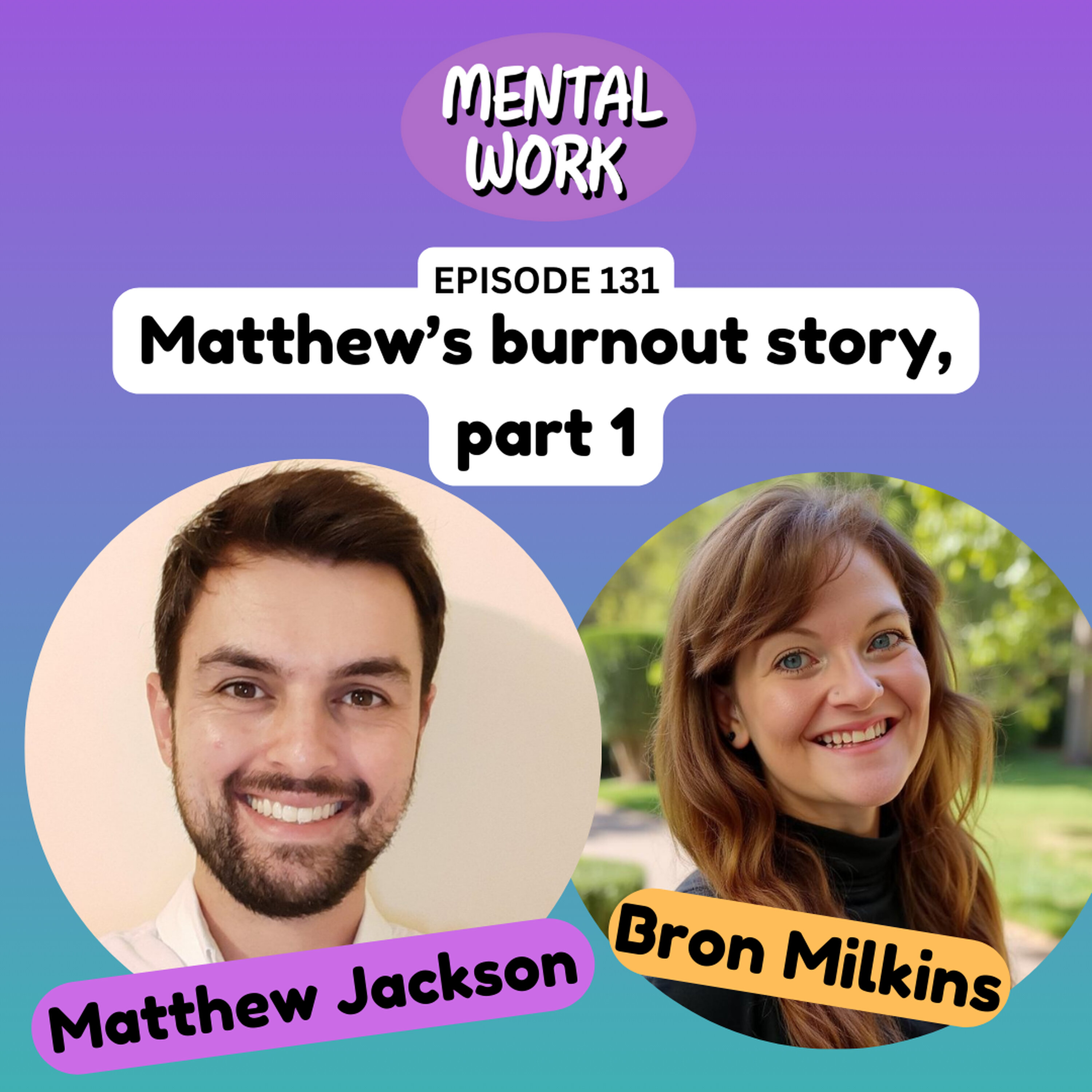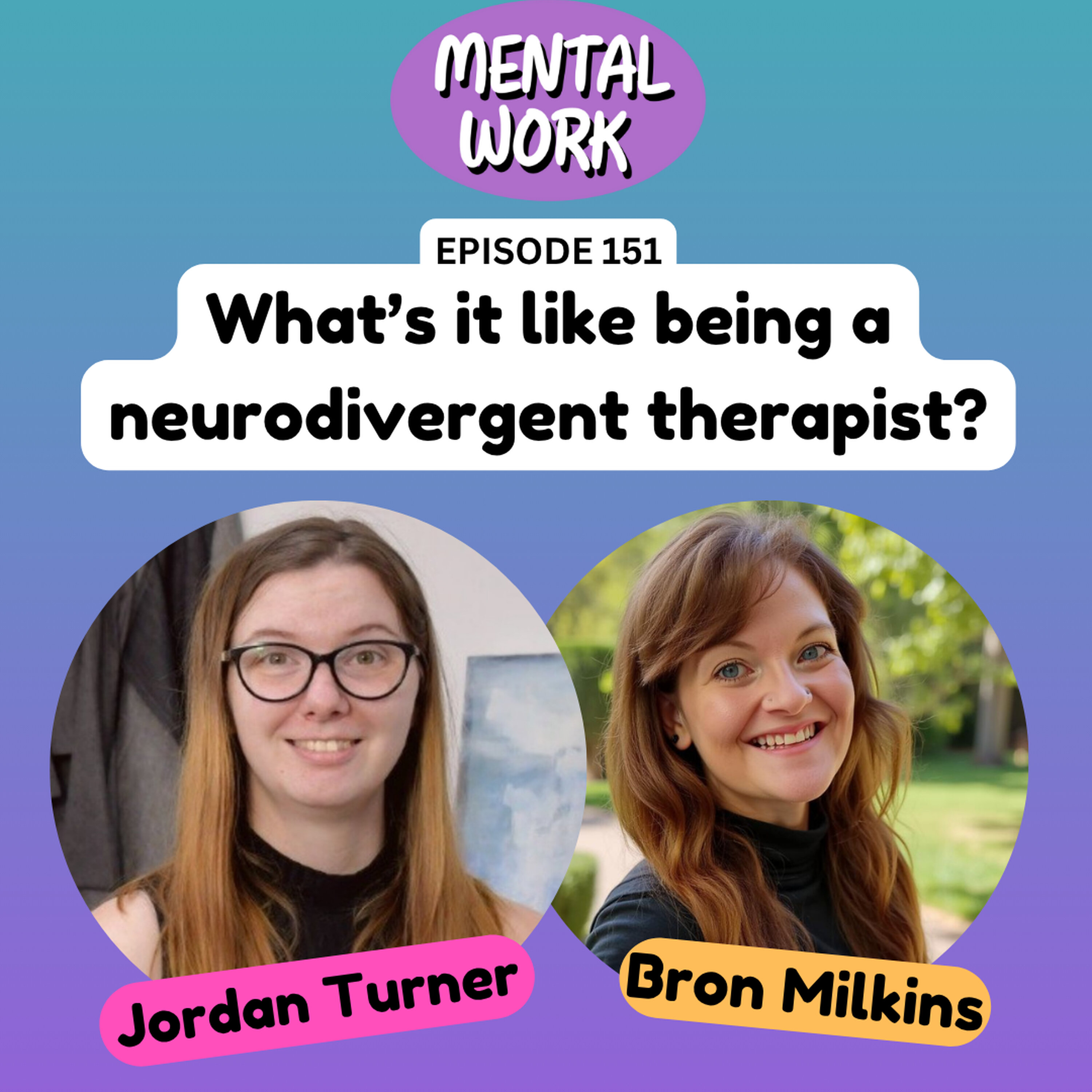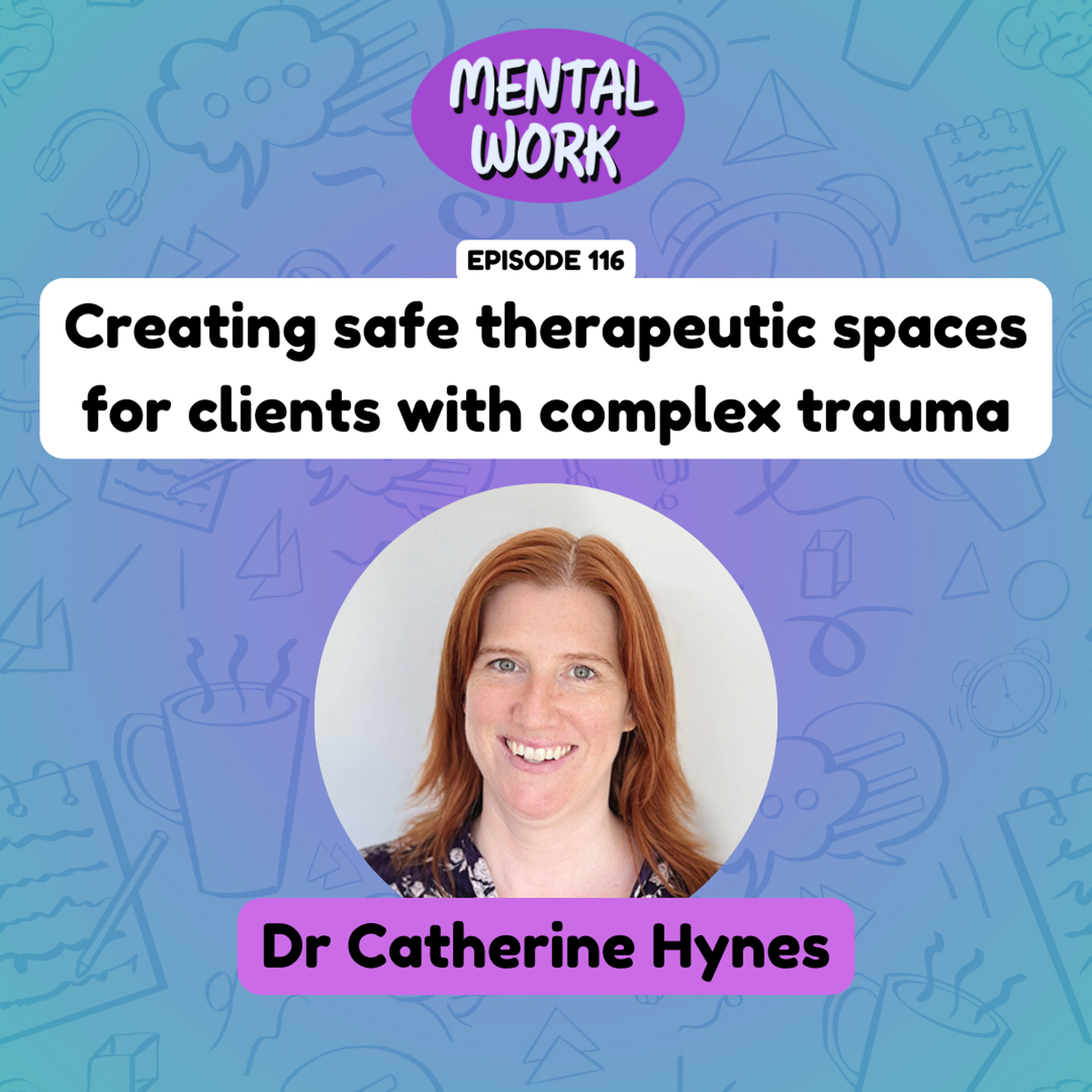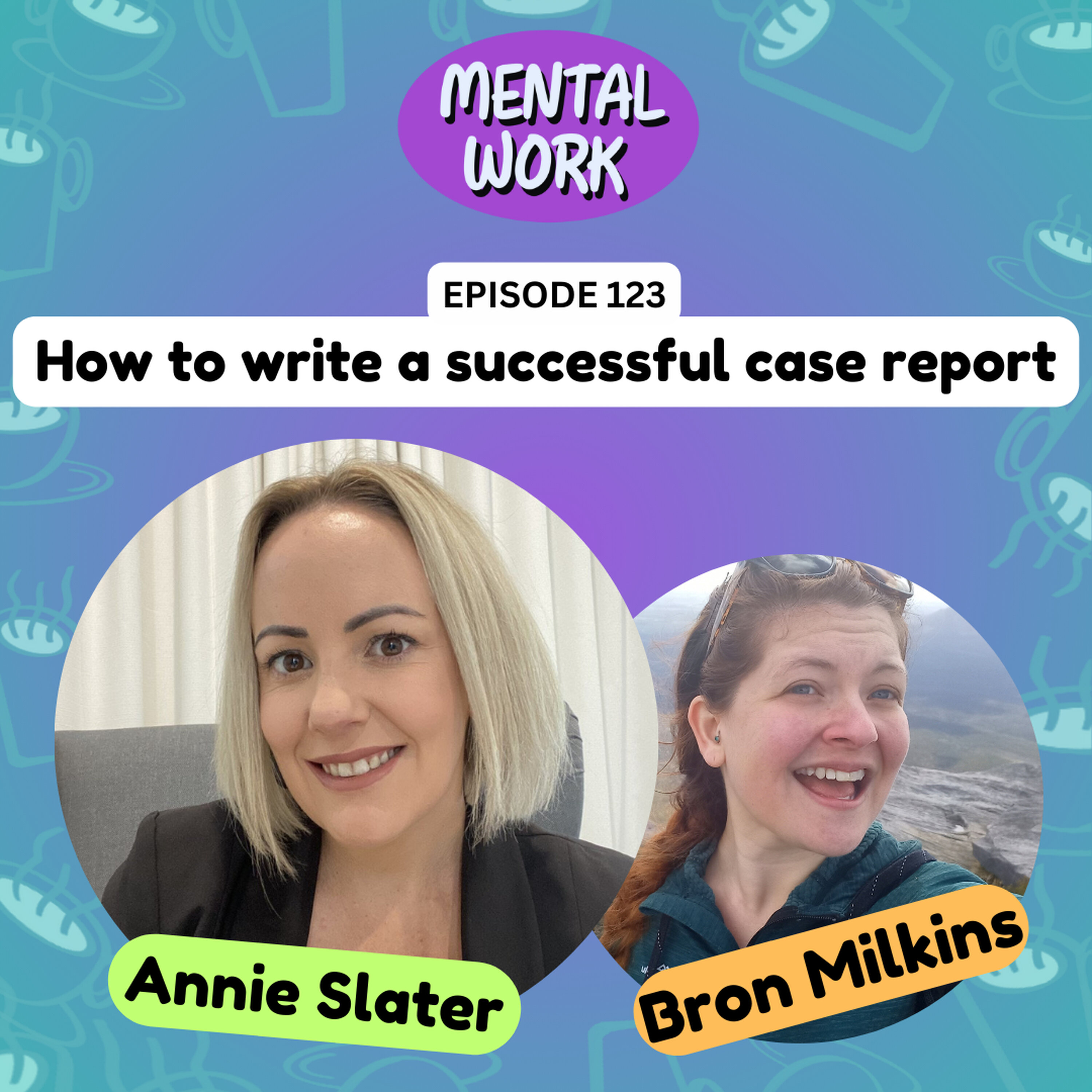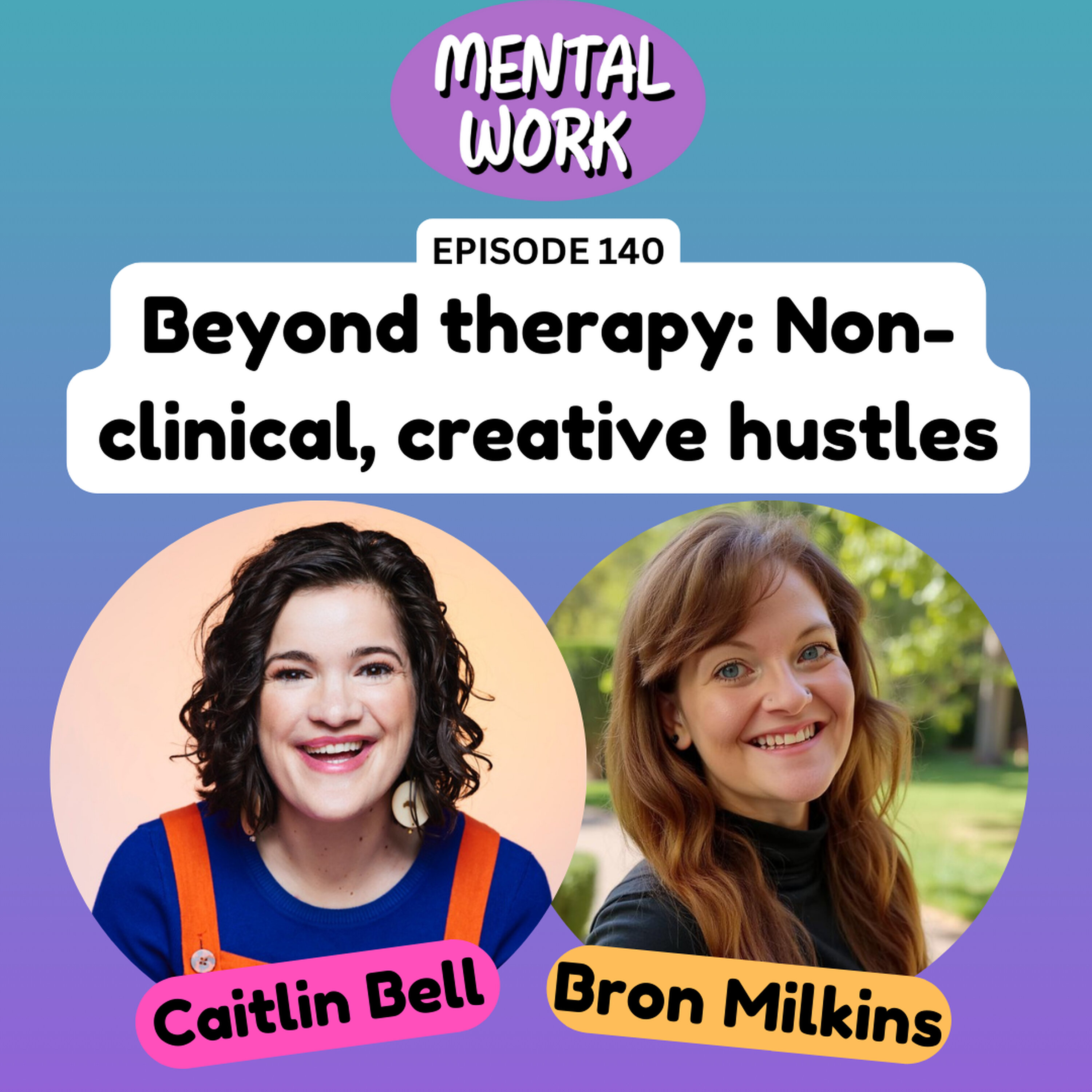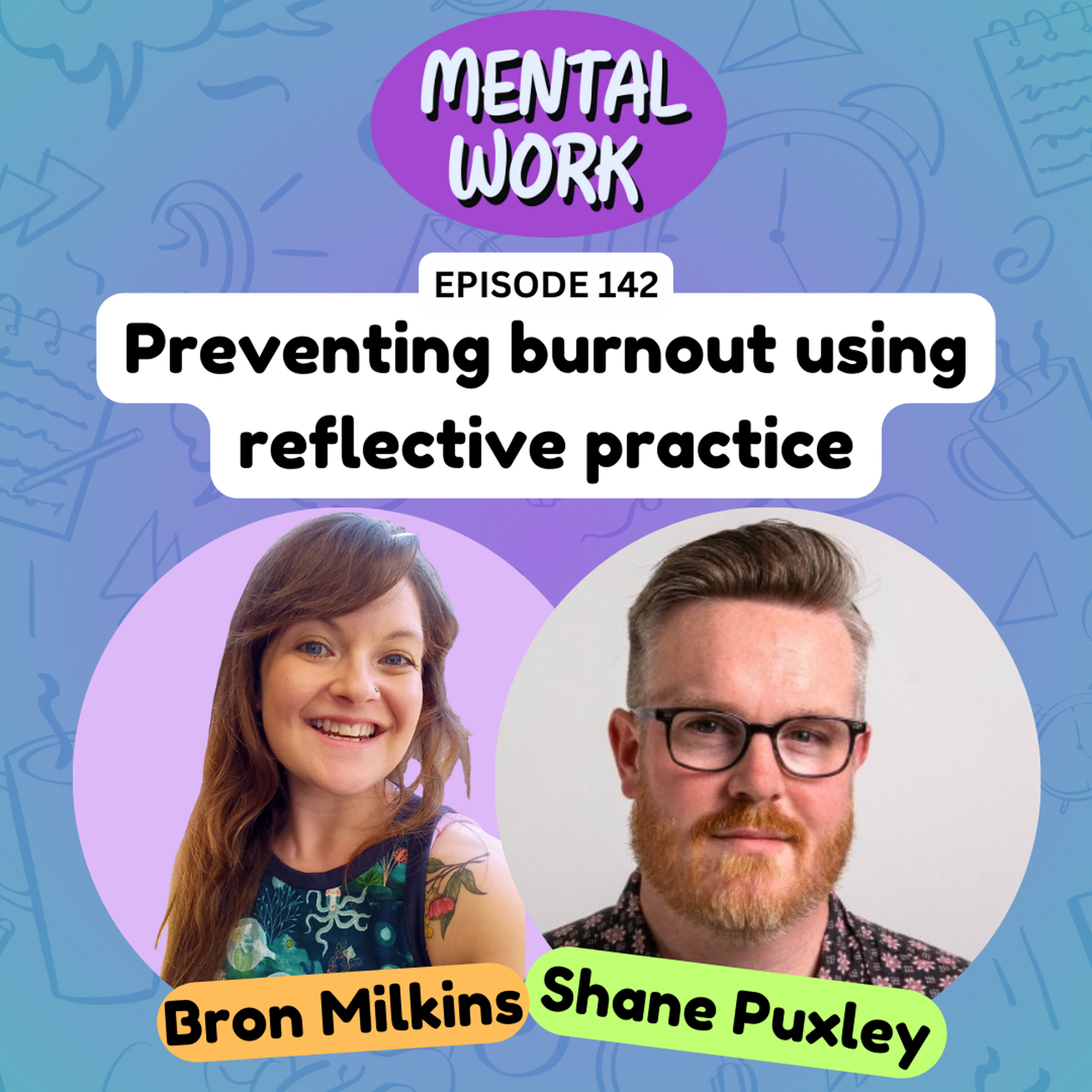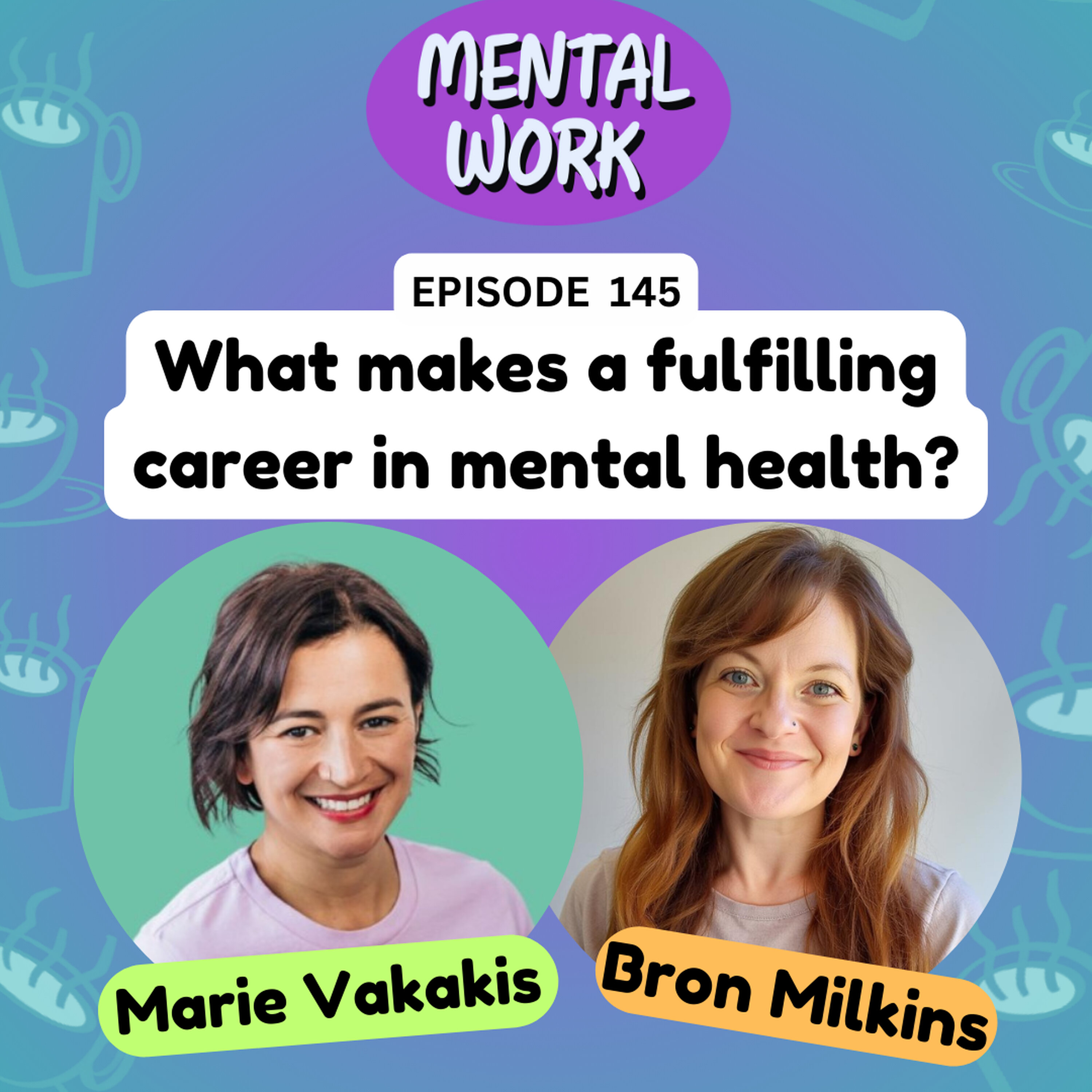Reflections on five years of practice (Solo)

In this solo ep, Bron reflects on five years of registration as a psychologist. She shares her Top 10 reflections and what she wishes she had known starting out. From shifts in professional identity, changes in approaches to therapy, and thoughts on finding your professional tribe, Bron offers her reflections on her early-career years (which she hopes will prompt your own reflections!).
THE END BITS
Mental Work is the Australian podcast for mental health workers about working in mental health, with an early-career focus. Hosted by Bronwyn Milkins .
Support the show by buying me a virtual coffee ☕🍵
Have a question, episode idea or just want to say hi? DM Bron on Instagram or email mentalworkpodcast@gmail.com
Apply to be a guest / YouTube (with captions & transcript) / Website
CREDITS
Producer: Michael English
Music: Home
Commitment: Mental Work believes in an inclusive and diverse mental health workforce. We honor the strength, resilience, and invaluable contributions of mental health workers with lived experiences of mental illness, disability, neurodivergence, LGBTIQA+ identities, and diverse culture and language. We recognise our First Nations colleagues as Traditional Custodians of the land and pay respect to Elders past, present, and emerging. Mental Work is recorded on unceded Whadjuk Noongar land in Boorloo.
Disclaimer: Mental Work provides informational content. Mental Work is not a psychological service and being a listener or guest does not establish a clinical or non-clinical relationship. Content should not be considered a replacement for professional consultation or therapy. All views expressed are personal, subject to change, and do not represent those of any affiliated service or organisation. Efforts are made to ensure accuracy, but opinions may not always align with fact. Listeners are encouraged to thoughtfully assess the information presented and report any inaccuracies or concerns via email . Further information can be found here .
See omnystudio.com/listener for privacy information.
[00:00:05] Bronwyn: Hey, mental workers. You're listening to Mental Work, the podcast for early career mental health workers who are figuring it all out. As always, I'm your host, Bronwyn Milkins, and today's episode is a little bit different. I'm sharing a personal reflection of what I've learned over the past five years since becoming a registered psychologist.
[00:00:22] Yes, it was in April, 2020 that I gained my full registration, and I'm wanting to share with you the insights, lessons, and realizations that have come from my own lived experience. Some of it is empowering, some of it is painful, all of it is honest. Whether your early career, mid-career, or just curious, I hope this reflection resonates with you in some way and maybe even opens up the door for you to do your own reflections.
[00:00:47] So, yes, April, 2025. That represents five years since I gained my general registration as a psychologist. I actually received my provisional registration back in 2017, and that was when I was completing my professional master's course. I then did the plus one year, which ended up taking over two years from 2018 to 2020. So technically I've been registered as a provisional and generally registered psychologist for eight years now, which is nuts to me.
[00:01:15] I started this podcast in 2021 when I was still very much in the early career phase, but now it feels like I'm entering the early stages of my mid-career phase. A lot has happened in the past eight years, and I wanted to take a moment to reflect and share 10 things I've learned from this early career phase, both to support you where you are now and maybe offer something relatable or even contrasting for those who are mid or late career. I've got 10 reflections and maybe 11 if I think of something along the way, so buckle in.
#1 Lot's of 'firsts'
[00:01:48] Bronwyn: The first thing I wanna share with you is that I had a lot of firsts early in my career, and some were really hard. But having experienced them now, I feel better able to cope going forward. So some of the challenging situations that I experienced in my early career included a client suicide an AHPRA complaint, a subpoena, `I also enforced cancellation fees. I had ruptures with colleagues and supervisors. I have terminated with clients. I've worked with clients whose values have clashed with mine. I've left workplaces. I've been in situations where I considered that I've been financially or practically exploited, and yes, they used to have really, really challenging.
[00:02:31] I guess my reflection is that this work is a bit of a minefield. You can have really good things happen, and I'm sure some of you listening maybe can't relate to some of my experiences and you've had really, really positive experiences. These are just my experiences alone and they're quite challenging.
[00:02:47] I do feel having gone through these experiences that they have built my resilience for the future. I now have a roadmap for what I would do in the future, and even though I had to learn the hard way, it makes the next difficult situation a bit less terrifying. Essentially, when I think of difficult situations that I encounter in the future, I'm like, that's all right, I've kind of encountered something similar. And I'm sure the challenges will be different going forward in my mid-career phase. But yeah, I feel like I have a solid foundation, and that's eight years. I think in the past eight years, if you had even asked me a year ago, I'd still say that I was floundering, but now I feel a bit more solid, like grounded.
#2 It's hard to thrive from a bad start
[00:03:28] Bronwyn: I think the second thing I wanted to share with you is that it's really hard to thrive when you don't get a good start. So for me, my first supervisory experience was harmful, and I found that that was quite damaging. I found it really hard to trust other psychologists after that supervisory experience, and I felt really on my toes. I felt hypersensitive. I felt hypervigilant for threat and danger, and it was only in meeting subsequent supervisors who I felt safe with, that some of that fear went down, and now I've met some exceptional psychologists who I'm very proud to call my colleagues, my friends and my supervisors who have really guided me along the way.
[00:04:10] But it was really difficult starting out, and so maybe a reflection for me is that I wish that I had somebody else in my circle when I was first starting out to tell me what was normal in supervision and what was normal in the workplace. Not only that, but what was acceptable and not acceptable because sometimes normal things can be not cool. If I was starting out now, I would've spoken more with other people outside my circle instead of relying on the one supervisor who I had, 'cause I didn't know what was normal. I didn't know what was acceptable and not acceptable.
[00:04:44] I think the other thing that I've realized about psychologists in general is that I was idealizing them too much. So when I went into psychology, I thought because psychology requires reflective practice, like you have to do it all the time, I thought that people who are psychologists would be more regulated than I guess people in the general population. And I have since discovered that that is not the case.
[00:05:11] So, psychologists are very much human and they're human in that they are authentic and they have lives and hobbies and families and things that they're passionate about, but they're also human in the sense that they can have tantrums and meltdowns and be emotionally dysregulated and have some of the personality factors that I guess are, are challenging to work with and, and be colleagues alongside. There are some psychologists who feel insecure and the mere presence of you is a threat to them, and they find that difficult to be aware of, and to be aware of their unconscious biases as well.
[00:05:48] So I think now, five years since being generally registered, I'm very much realistic about who my colleagues are and trend towards people who I consider a safe, rather than I guess assuming that everyone is going to be an okay person who I want to work with or even be friends with, or colleagues or acquaintances. So that's something that I've learned and I feel much better known that rather than having this unrealistic idealization really.
#3 Shifts in professional identity
[00:06:19] Bronwyn: Thing number three that I have learned is that my professional identity has shifted a lot since I started out. So I remember when I first started working in psychology, I would never have admitted that I had ADHD or this other condition that I have called premenstrual dysphoric disorder. In fact, I remember actively hiding it.
[00:06:40] So with my ADHD early on I was exhausted all the time. I was seeing six clients a day, my first psychology job, and I remember thinking, boy, if I just had a break in the afternoon, or if I just had some additional accommodations so that I could. Get through the multiple incoming information that I'm dealing with so that I could take my time and work out systems that worked for me rather than being quite inefficient overcomplicating things, which I tried to do to compensate for my ADHD related deficiencies, um, that would've been great, but there was no way that I was going to tell my workplace that that's what I needed. No way. I thought that the stigma was too high and that I wouldn't be accommodated, and that they would just tell me that I'm not cut out for this work.
[00:07:26] Similarly with my premenstrual dysphoric disorder, or PMDD, I usually need one or two days off work a month, and that's just because I wake up and I'm completely exhausted. In the week before my period, I'm the symptoms are not great, but I can still work. And uh, I remember just waking up completely exhausted multiple times over my early career years and never asking for a day off, never wanting to let clients down, and I would show up not at my best, and I would still work.
[00:08:00] So things that have changed now is that, thank God we have a neurodivergence affirming movement, which I'm very grateful for, and I feel like the emergence of that movement, or the strengthening of it over the past few years has released and reduced some of the stigma that is associated with ADHD and related conditions. And so, I think I would feel more confident now, and I actually do, and I, I tell my employer when I'm, when I'm having like PMDD related symptoms or if I need things for ADHD at my current workplace, there's a wellbeing room, which is a low sensory room where I can go to and I can just take a break from all the sensory input and then I feel much better able to resume my work. It's so good and I love it. So I'm really grateful for those accommodations and acknowledgements as just differences rather than weaknesses. And so I feel, I feel good like my, in terms of my professional identity, it's okay to have these conditions and be a psychologist.
[00:09:01] Another thing that I shifted in terms of my professional identity is how I show up at work. When I first started out, I literally spent about $1,500 on professional clothes, air quote, professional, and they were, they were actually professional, I don't need an air quote. Like I went to David Jones, I went to Myers, and I bought some really expensive, fancy clothes, because I thought that that's how I needed to show up and how I showed up was how I needed to be to be accepted, both my clients and my colleagues. So I put on this professional front. I wore makeup, I did my hair really nicely, and it's what I felt I needed to appear together.
[00:09:41] And now I feel like I can still be professional and I don't have to go and buy expensive clothes or wear makeup or do my hair really nice. I can just show up and be neat and tidy and I can wear jeans. I can be myself and that's okay. And I'm no less professional than if I were to show up in those clothes. And if anybody is listening and they love wearing expensive clothes and they love doing makeup, that's fantastic for me, personally, I think that you can do that. Absolutely. I don't judge your professionalism either way. I think that's you and that's fantastic. And for me, I'm okay with that.
[00:10:24] I'm also starting to be more authentic in my personality. I'm a really bubbly person. I'm really curious. I love talking. I love asking questions because I'm genuinely curious. I love laughing. I love joking around. Um, but I can also hyper focus like a machine. I'm trying to be more authentic in that way. Again, just trying to help break down my own barriers around what's professional and what's not. And the message that I've gotten is that you need to be focused all the time and not laughing and not bubbly, and not curious and not asking questions. And so I'm trying to challenge that mainly because it's exhausting to hide those things for me. So I'm just trying to take care of myself really, but also trying to break down what's professional and what's not.
#4 Managing sense of isolation and belonging
[00:11:10] Bronwyn: The fourth reflection that I have is that when it comes to isolation and belonging in psychology, it's really complicated. I think one thing that I tried to do over the past few years was find where I belonged in mental health work in psychology. I tried joining societies, modality based groups. I tried attending events. I often felt outta place, and part of that is the, is because of my own schemas. So I have this schema called social isolation. It's, it's what it sounds like. You just feel like you're on the outside. Even if there's evidence to the contrary.
[00:11:45] So part of it is that, but the other part I think objectively is that it's hard to find where you belong because refer to your reflection point earlier, there's so much diversity in the humans who come work in mental health that, yeah, it's, it's hard to find out who you gel with.
[00:12:01] Where I've found that I'm most comfortable is associating with people who are in the sexology field. So I did a postgraduate certificate in sexology in 2023, and I loved it and I still love it. And I love doing professional development on sex, gender, sexuality, sexual health, and I love talking with people in the sexology field. I just find that many of them have done deep self-reflection, both as part of our university training, but also as part of their own work, because part of studying sexology involves interrogating your own beliefs, your attitudes towards sex, sexuality, gender, and working out where that's come from and how it's contributed to the person who you are now.
[00:12:45] So I feel quite safe with other people who study sexology and to a lesser extent, I also feel safe with other neurodivergent clinicians. I find it really easy to get along with neurodivergent clinicians. I was at a conference last year and it's like I can pick out the neurodivergent group, and we all went off to our corner to eat lunch and I was super happy and I could chat with them, but equally, if they didn't wanna talk, I felt really comfy that I didn't have to talk. So I found that really easy as well.
[00:13:14] And it's, it's good to find that out because I think I was just trying to go between a few different groups. I didn't quite know where I belonged. Nothing really felt easy. It all felt kind of challenging, and so it feels more safe and secure knowing that there are some safe people who I can talk to and rely on, and that's all I need.
[00:13:35] I've also found that my strongest sense of belonging isn't necessarily in professional settings. As I said, I was trying to look for belonging in the field with other colleagues, but I found as I've widened out my non-work hobbies, that I found more belonging in those settings. So I feel really comfy and at home in choir, with dance classes and casual coffee catch-ups with non-psych friends. And I've also met a lot of friends through the podcasting community.
[00:14:06] So these things have really helped as well. I think that for me, working in mental health has been quite isolating, particularly I had a solo private practice and yeah, it was, it was quite lonely. So having these sources of community and connection has been very important.
#5 Starting private practice was easier than I thought (sort of)
[00:14:24] Bronwyn: Reflection number five, starting a private practice is easy. Practicing well is not, and there's no way around this work not being challenging. So let me expand on this. I think that a myth that early career mental health workers are told is that starting your own private practice is hard. I think that they're told this mainly by people who are group owners because maybe they want you to keep on contracting or being employed by them.
[00:14:53] The truth is you can buy a few business books. There are small business courses. You can call your local small business advisory, and you can talk with an accountant, an insurance broker, and a few other people, you can have a few sessions with a business coach and look, you're well on your way to starting a private practice. Lots of people start businesses, and I think for psychologists, people who work in mental health, it's not a skillset that you can't learn.
[00:15:21] What I found is harder is practicing well within that private practice. So for example, setting and maintaining boundaries with clients, navigating client dynamics, particularly with clients who have challenging dynamics, and holding space for distress... that kind of clinical practice is much harder. It's much harder for me, and it was than starting a business.
[00:15:45] So that's what I've found challenging and I had my private practice for four years, and I think what I've learned is that right from the start of doing any work, I need to make sure that that work fits for me and not fits to some standard that works for everyone else. For example, what I've found in my private practice that works best for me is seeing four clients a day. That's it. No more. No less four clients is so that is maintainable for me and doesn't make me go crazy.
[00:16:16] Having lots of time off also works very well for me. Having excellent systems also works very well for me, so I spent a lot of time setting up my systems, like my templates, to take the brain work out of, say, replying to clients in difficult situations. I already had a template, and I think this is particularly important for someone who is an ADHD'er because, one thing with ADHD is, I mean, if you're inattentive versus impulsive, I'm both, the impulsivity means that you can just reply straight away and you might not be as emotionally regulated as you should be. And so when you reply straight away, you're gonna say things that you look back on later and be like, oh, I shouldn't have said that. So the way that I, I have helped myself is by always having templates and thinking well ahead of what I would say to client in this situation.
[00:17:03] So I think overall the reflection here is that you need to find what works for you, not what somebody else says will work for you. And I think you need to listen to your gut feelings in that. So for instance, something that I really needed early on, which I told actually my own psychologist, I said to her, I really need more supervision and I really need to be able to ask questions of my supervisor in between our supervision sessions, and I don't need a long reply. I need a short reply.
[00:17:34] And she said to me, that'll build reliance on your supervisor rather than your capacity to practice independently. And I completely understand her perspective, however, at the time, I was less than a year fully registered. I had just started my own private practice and my gut was telling me that this is the kind of support I needed, and I think I was right, and I think I should have listened to myself. Instead, I listened to her that I was going to become reliant on my supervisor, which is something that I've never done by the way, in terms of my relational dynamics, I'm quite an independent person. So I don't think I was actually at risk of becoming reliant, it's just that I needed extra guidance because I was encountering a lot of difficult situations.
[00:18:15] I take that as an example of it's important to listen to your own gut in some situations rather than other people's idealized or non-specific versions of what you should do and who you should be.
#6 Letting go of pursuing perfection
[00:18:29] Bronwyn: Okay. Reflection number six. This is a reflection that... I wish I wasn't pursuing being the perfect therapist, but if I'm honest with myself, it's still there... I would say that it's actually intensified, and that's especially in light of receiving a complaint, uh, like two and a half years ago now. So after that complaint, my confidence really plummeted and I feel like now I overanalyze everything I do in say in therapy, whereas I feel by this stage of my career, I wish that that had gone down.
[00:19:03] And I guess this is to say that, some things have gotten easier, but some things get harder and you have different challenges. And I mean it's same as in life, like you think things are gonna be easier as you get older, but actually you just have different sorts of responsibilities and different sorts of challenges as your life stage differs. And that's the same in terms of our work in the mental health field.
[00:19:24] And because of this dynamic that I find within myself, which is wanting that perfection and being terrified of saying the wrong thing, it's why I've taken a break from clinical work right now. So currently I'm working in research full time, which I'm really enjoying, and it's to recalibrate because the feedback from my clients and my supervisors directly contradicts my inner critic. If you look at my supervision reports and the feedback that I've gotten from supervisors and even external supervisors who have reviewed videos that I've done in therapy, the feedback is excellent. They couldn't be happier with my work. But for me, my own inner critic is drowning that out and I need to do some work to be able to reign that in and be more kind and compassionate to myself.
[00:20:09] I think this can come up at any stage of our careers. This out of whackness with that inner critic versus the objective feedback. And yeah, I think I'll probably need to do the same thing in the future just because, I guess, personality wise, I'm too hard on myself.
#7 Shifts in values
[00:20:27] Bronwyn: Reflection number seven is that my values have really shifted since starting out compared to where I am now. Early on I was really striving for mastery, which I think is what early career psychs really do strive for. We just wanna be able to do the therapy to be able to know what our supervisors are talking about and say, like, I know how to do behavioral activation. I know how to help somebody work out the... their core beliefs. We all wanna be able to feel competent and to feel good and know what to do.
[00:20:58] So those were the things that I was striving for in the first few years. And, now in my work with clients, pretty much the main thing that I care about is the status of the therapeutic relationship, and I think that's because I've got all these tools under my belt, so I know that. So I've moved into a next phase, which is assessing how safe, trusting, and authentic the relationship is, including what ruptures exist, and how am I repairing them and working towards that with my client.
[00:21:29] I think that I've focused more on these interpersonal dynamics because I've recognized that having the tools in your belt, so like knowing a therapy like schema therapy or acceptance and commitment therapy is really only one part of being a, a good therapist in my opinion, and the other half is entirely interpersonal. Things like rupture repair, things like attachment dynamics. So how you and your attachment impacts the client and how the client's attachment impacts how they see you and interact with you. And I need to pay attention to these things because they impact the client's capacity to get what they want outta therapy to reach their goals.
[00:22:10] So I am still working on improving the therapies that I already used. Like I'm a certified schema therapist and I'm still working to improve my imagery, rescripting, and my chair work. But I'm also focusing mainly on improving my capacity to detect ruptures and repair ruptures, and to be able to attend to those interpersonal dynamics in the therapeutic relationship.
#8 It's okay to not have everything figured out
[00:22:32] Bronwyn: Reflection number eight. I still don't have everything figured out and that's okay. So eight years in, and I still don't know my niche. I remember when I first met with a supervisor who wanted to do some coaching around my business, and she was like, you need to find your niche. And I was like, I don't know what my niche is.
[00:22:52] As an ADHD, maybe there's some listeners who can relate, but I'm truly interested in everything. Nothing is my niche because everything is my niche. And I've just stopped fighting against it. Again, it's kind of like somebody says you should do something, and that comes from well-worn advice, but sometimes just doesn't fit with the person who you are and where you're going. I can totally understand wanting to have a niche from a marketing perspective. I think from a burnout reduction perspective, you can focus on one presentation and that can help reduce the risk of burnout. That's the most compelling reason for me, why I would try harder to do that. But for me it was just placing extra strain, trying to work out what my niche was.
[00:23:33] If people had to ask me my niche, I would say it's what I'm best at. Um, which is helping clients with anxiety disorders, that's what, that's what I do best and, and neurodivergent clients as well. But in terms of anything else, I really don't have it settled on, and I feel like that's okay.
[00:23:52] Another thing that I don't have figured out is I don't know where I'm going in my career. I have no idea. And another thing that I don't have figured out is my life. It's not perfect by any means, and I think you don't have to have these things figured out to be able to be okay, where you are now in your career. At least that's for me.
[00:24:12] I am feeling a leaning towards working more in policy, like doing research that's more sociological, that's more invested in human rights, but I'm also feeling a clinical leaning towards doing couples counseling. And maybe I'll keep mixing clinical and research work or just do one or the other. Whatever is happening, I feel like it's okay to not have those things figured out and I don't feel like I'm behind, which is can mirror where we are in life and I think that's okay. I think there's this myth that psychologists have to have their lives figured out, and I don't think that's true.
#9 Advice to my early-career self.
[00:24:47] Bronwyn: Reflection number nine or 10, I've lost count. Is that. If I could give advice to my early career self, it would be that you don't have to be as perfect as you think you need to be, and I wish that I hadn't put so much pressure on myself to know everything immediately. I realize now that it was an anxiety reduction behavior. Like I would spend hours after work and out of hours trying to read up about therapies to make sure I knew how to do things, working on formulations for clients, working on treatment plans. I'd spend ages doing that.
[00:25:21] And I know that it was, like I said, an anxiety reduction behavior, but it's just because I wanted to know everything. I think it's so hard to empathize with the fear that comes from being in front of somebody who is vulnerable, who is having mental health challenges or life challenges that they're seeing you for and not know what to do. I felt like I had to have all the answers and have it all figured out, and I didn't have those interpersonal skills to rely on. Like, sure, I could be nice to somebody and listen and reflect and support, but there was definitely clients for whom were looking for more specific guidance. And I didn't even have the skills to be like, I think you're looking for something from me, and then be like, yeah, it's guidance and to have that discussion with them. I didn't know how to do that therapeutically or in a good way. So I felt like I had nothing, and that's why I was pressuring myself so much to know something at least.
[00:26:17] So I wish I hadn't put that pressure on myself. But also at the same time, I do feel like the standards placed on myself and on early career psychologists in general are objectively too high. I think we are thrown into an enormous amount of complexity and responsibility with not enough support to help us along the way. I think it was, for me, the reason why I was waking up in panic in the middle of the night and not knowing what to do and just feeling so stressed out, because I would have these complex clients with complex lives and complex issues, and I would only have like one hour of supervision a week, and that's to go through a caseload of 40 clients. It's not enough. It's objectively not enough.
[00:27:05] I think what I would do now, or what I would do differently is I would not feel embarrassed by needing extra support, because I did, I absolutely needed extra support, but I figured because everybody else gets this level of support that that's the level of support that I need. And I think I'd just be more realistic with myself that like, just because it works for other people doesn't mean it's gonna work for me. And I would've gotten like three or four hours of supervision a week, whatever I could grasp, whatever I could get.
#10 There is still so much to learn
[00:27:34] Bronwyn: Reflection number 10 is that there is still so much to learn. So, being a psychologist is truly an interesting profession because there is never, you're never going to reach the peak or pinnacle of things to learn. I still feel overwhelmed by the sheer amount of learning involved in this profession.
[00:27:53] For example, as I said earlier, I've gone into research full time. The things that I have needed to learn for research has been incredible, and I've done a PhD. I still feel like there is so much to learn and that my brain cannot possibly take in any more information, just like working clinically. So some of the things that I've learned or had to learn in my research role include upskilling on the research on dissociation and children, adolescents, running a pilot study, learning new software, putting in ethics applications, writing up ethics applications, collaborating with people with lived experience and learning and refining my qualitative data analysis skills.
[00:28:33] So I feel like in this early mid-career phase, the learning hasn't slowed down. It's just shifted focus. And for me, the learning is that... it's always that you need to take care of yourself. So because the learning is always going to be overwhelming, there's always gonna be so much to learn, there's always going to be challenges. It's always going to be difficult to work out what to do... you need to make sure that you're looking after yourself. I need to make sure I'm looking after myself because I am the only one doing the work. So I need to be connected with other people who are supportive, with supervisors, who can help guide me with colleagues who I can ask questions of, and it's about working out what I need and not being afraid to ask for it and go get it.
Final reflection!
[00:29:23] Bronwyn: Finally, I have a bonus reflection for you. Is that. The things I was concerned with starting out are so different to the things that I'm concerned with now, and I think that's reflected in the podcast. So a lot of the things that I have thought about over the years have directly made it into podcast episodes.
[00:29:42] For example, some of the early episodes of this podcast were like, what do I do if I feel like I'm not helping people? How do I find my niche? Should I go get another qualification? These were questions that I was asking myself, which then translated into podcast episodes.
[00:29:57] The questions I ask myself and grapple with now are a little bit different. So I'll give you the thing that I'm currently discussing with myself and with other people about, is that I wonder whether therapy is repeating relational patterns that aren't good for me.
[00:30:12] So for me, I moved around a lot as a child and I went to a lot of different schools. So that involved having relationships that ended suddenly, and sometimes very in-depth relationships that ended. And literally the next week I would go to a different school and just have to pretend that those relationships didn't exist and just carry on with new friends.
[00:30:32] That happens in therapy or it can happen with therapy. You have in-depth relationships that suddenly come to an end. They might not be resolved. The client might just end therapy and you hear nothing from them, or you as a therapist have to terminate therapy and it, you just have to go on. And something I've been asking myself is I wonder whether it's repeating the grief of having to do that again and again as a child and whether that's healthy for me doing that sort of clinical work, and maybe I need to adapt therapy to be a little bit healthier for me.
[00:31:04] Another thing that I also ask myself is whether the masking is too much in therapy. So I'm authentic to an extent in therapy, but I also maintain a professional persona for hours each day. It's really exhausting and it leaves me with pretty much nothing left in the tank for friendships or other relationships, and so I wonder whether therapy takes too much from me. Maybe therapeutic relationships are just not workable for me, like there's nothing else to give in my life because they're too taxing.
[00:31:32] It's not something that I have an answer to. It's just questions that I'm asking myself, and I thought that I would share it with you because this is where I'm at after five years of being generally registered. Some of these questions that I'm asking myself might show up in future episodes of the podcast, and at least you get some insight into where I'm in now so that you can see what's happening with the podcast topics over the years.
[00:31:54] So, what's the next few years looking like for me? Well, I'd really like to become a supervisor. I love group therapy, so one of my first jobs in psychology was doing group therapy and I love the group dynamics of group therapy and I'd love to do group supervisory sessions.
[00:32:12] I still also wanna keep delivering therapy. I really enjoy delivering therapy. I find that it's really cool. There's nothing else quite like it. Listening to somebody validating them, supporting them, challenging them, helping them get to where they wanna be, helping them get what they want out of therapy is something that I get on board with, with clients really easily, and I genuinely wanna be a good part of their journey. So I will continue doing therapy. I just need to work out. How it's gonna be healthy and sustainable for me.
[00:32:46] I also wanna stay involved in research. I'm really enjoying doing research and I'm really loving it, and I hope that I can stay in that field too. I also wanna get more informed and braver when it comes to mental health policy because we receive no training in policy. I find it really difficult to understand. I dunno about you, but I do. But I'm really passionate about it. I'm really passionate about social justice and equity, health equity, and I'm really passionate about people having access to mental health services when they need it, and adequate wellbeing. So I really wanna be able to form strong, informed opinions and speak up in advocacy spaces.
[00:33:27] So that's it from my reflections on five years of being registered as a psychologist. What has changed for you? If you were at a similar stage to me, maybe you can do your own reflections on what it's been like for you over the past few years. If you're in the early stages of your career. Maybe some of the things that I am sharing with you resonate with you, or maybe they're completely different. What are some of the things that you would've told yourself if you were just starting out? Or maybe there's some things that you need to have a talk to yourself about right now?
[00:33:59] If you are later in your career than me, are some of the things I'm talking about similar to where you were at when you were in my shoes, or are they completely different? And what would you add to my reflections? What do you think I've missed?
[00:34:12] There's, there's a lot here and I hope this is a good conversation starter for you, maybe in your supervision or own therapy or reflective spaces, or maybe just in discussion with yourself.
[00:34:25] Thank you so much for listening to this solo episode of Mental Work. I'd love to hear what resonated with you or what your own reflections are. You can find me on Instagram or email me at mentalworkpodcast@gmail.com. And if you're finding these episodes helpful or enjoyable, please consider leaving a rating or review and share it with a friend or a colleague. It really helps the show grow. Until next time, I'm Bronwyn Milkins, you've been listening to Mental Work. Take care of yourself and each other and catch you in a future episode.




